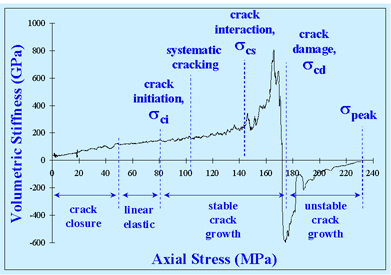Stress-Induced Brittle Fracture Processes |
|---|
|
The excavation of an underground opening in a stressed rock mass results in the deformation of the near field rock due to a redistribution of stresses, resulting in induced stress concentrations. This stress redistribution increases strain energy in zones of increased compression. If the resulting imbalance in the energy of the system is severe enough, it can result in the progressive degradation of the rock mass strength through fracturing. Recent work at AECL's Underground Research Laboratory in Pinawa, Manitoba, has shown that high compressive stresses near the tunnel face significantly contributes to the loss of strength, and eventual failure of the rock, through stress induced brittle fracturing. Thus it is important to establish the thresholds associated with micro- and macro-scale fracturing in the in situ rock mass. Several studies have been performed to investigate the effects of brittle fracture on the progressive degradation of rock mass strength. The work carried out in this study involves a detailed analysis of the crack initiation and propagation thresholds, two key components in the brittle fracture process. In this sense, the failure process of brittle rock can be broken down into a number of stages based largely upon acoustic emission and stress-strain measurements recorded during uniaxial and triaxial laboratory tests. These stages, as determined for Lac du Bonnet granite, include, with increasing compressive load, crack closure, crack initiation, stable crack propagation, crack coalescence and unstable crack propagation. 

Additional studies include the investigation of:
|
| In Collaboration With: |
|
|
| Contact: |
|
|